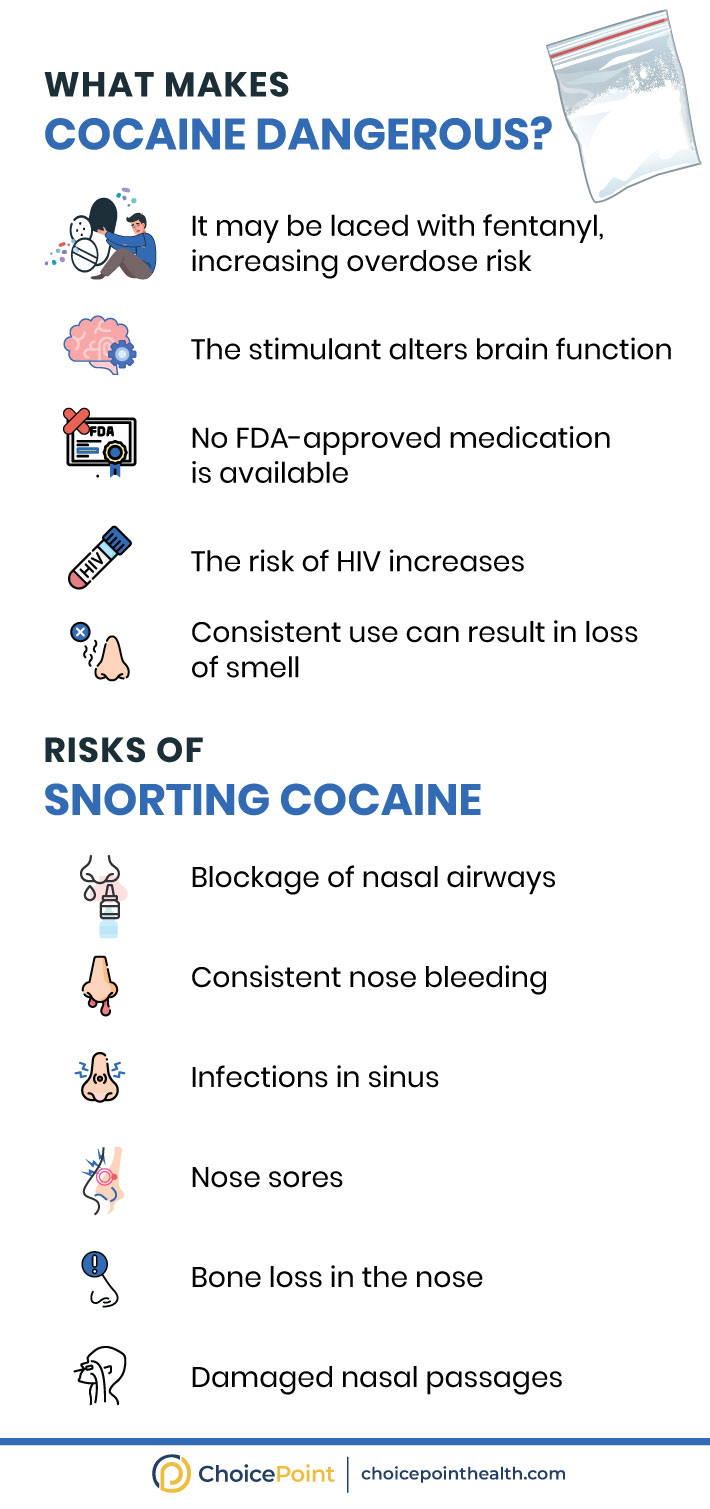Cocaine is one of the deadliest illicit drugs in the country. About 23% of overdose deaths in the US happened due to cocaine. Cocaine poses several different negative consequences apart from losing your life to an overdose. The number of fatalities went from 6,784 in 2015 to 15,883 in 2019. Cocaine may be smoked, snorted, injected, or orally ingested. However, snorting is the most commonly opted-for way to use cocaine. Snorting cocaine or injecting is an alarming issue in the US, and to fight it off, it is important to undergo personalized addiction treatment. Get help from ChoicePoint DEA-certified practitioners.
Table of Contents
What Does a Cocaine High Feel Like?
Cocaine is a central nervous stimulant that was essentially used as a medicinal drug. However, it is not in use anymore, and crack (cocaine) is still being used rampantly as an illicit drug in the country. Here’s what cocaine will make you feel:
- Excited
- Hyperalert
- Sleepless
- Concentrated
- Euphoria
Since cocaine’s high is very short-lived, individuals will keep pumping cocaine through the body to experience the same feelings.

Did you know? In FY 2022, 20,037 reports involving trafficking offenses involved drug use, 5.6% of them involved crack cocaine.

Did you know? In FY 2022, 20,037 reports involving trafficking offenses involved drug use, 5.6% of them involved crack cocaine.
Short-Term Risks of Consistent Cocaine Snorting
Cocaine users feel the need to snort or consume cocaine after short intervals to stay high. However, it is a hazardous practice and poses short-term and long-term risks. Short-term risks include:
- Increased heart rate
- Increased body temperature
- Restlessness and anxiety
- Heart issues
Since cocaine is a stimulant, it increases brain activity more than normal, leading to disturbances in the overall functioning of a person.
Long-Term Risks of Snorting Cocaine
The short-term side effects, like disturbances in heart rate, become a cause of concern in the long run. As explained in this section, a consistently increased heart rate can result in some serious issues.
- Heart failure
- Stroke
- Lung damage
- Affected cognitive functions like decision-making
- Anxiety
- Hallucinations and paranoia
- Respiratory issues
Cocaine Addiction Symptoms: When to Seek Help
Sometimes, drug users have a difficult time accepting that they have an addiction. To understand if you have developed a strong dependence on the harmful stimulant in question, read the following signs.
1. Taking More Cocaine Than Desired
If you take larger amounts of cocaine than you had decided. It can be a major sign if you are doing it frequently.
2. Mixing with Other Drugs
After taking a drug for some time, developing tolerance is a very common phenomenon. This can lead the individuals to mix different drugs to feel the same high. Or, even increasing the dosage for the sake of experiencing high is a clear sign of addiction.
3. Inability to Control Cocaine Ingestion
If a cocaine user is unable to control their urges and find themselves taking the drug despite deciding not to, it may mean that they have developed some degree of dependence on the drug.
Find yourself struggling with these symptoms. Contact us at 844.445.2563 or fill out the form here to contact us.

Dangers of Snorting Cocaine
How to Get Rid of Cocaine High? Personalized Treatment
It is challenging to get rid of cocaine addiction on your own due to the severity of withdrawal. However, with the right level of care and personalized addiction treatment, you can overcome addiction.
What Does Personalized Treatment Entail?
A personalized treatment comprises a combination of treatments to treat a person according to their needs. Some commonly opted-for interventions are coupled to treat addiction to snorting cocaine.
A. Detox and Counseling
If your doctor deems it important, they may ask you to take counseling sessions while undergoing cocaine detox. Detox is a medical procedure in which cocaine, or any other drug, is removed from the body. This process is important for:
- Physical withdrawal
- Preparing the body to be drug-free
Counseling is usually combined with detox to address the behavioral and emotional toll of snorting cocaine. Counseling is important:
- Addressing psychological withdrawal
- Developing skills to deal with cravings
- Managing mental health issues like paranoia or hallucinations
Call us at 844.445.2563 or enter your information in this form. Our assistant will help you navigate through the whole admission process.
B. Medication-assisted Treatment
Currently, there are no FDA-approved medications for treating cocaine addiction. However, some medications like Divalproex have shown effectiveness for the drug. Understanding the depth of every patient and their issue with drugs, a personalized treatment coupling MAT and CBT can be offered.

Did you know? 68% of cocaine users are likely to use other substances like opioids as well.

Did you know? 68% of cocaine users are likely to use other substances like opioids as well.
While there is no MAT program for treating cocaine addiction, it may be offered if a person is a polydrug user. Some people who use cocaine may also abuse opioids; if you also struggle with this, our medications for opioid use include:
- Suboxone
- Subutex
- Narcan (Naloxone)
- ReVia (Naltrexone)
C. CBT and DBT for Cocaine Addiction
Therapy is often the only option available for cocaine users. CBT and DBT are the two most commonly used and effective treatments for cocaine addiction. DBT is also not very different from CBT. The only difference is that DBT focuses more on accepting your condition and moving toward interpersonal relationships. The key focuses of therapy are:
- Developing healthy coping skills
- Accepting your condition and changing it
- Challenge unproductive thoughts
- Doing something about it practically

Did you know? CBT has proved to be effective in both outpatient and inpatient settings when it comes to cocaine treatment.

Did you know? CBT has proved to be effective in both outpatient and inpatient settings when it comes to cocaine treatment.
Personalized Treatments Only One Form Away!
We specialize in offering personalized SUD treatments. After discussing your condition with our specialists, you can select any level of care. From intensive to moderate care, we have it all.
- Inpatient Cocaine Addiction Treatment
- Partial Hospitalization/High-Intensity Outpatient Program (HIOP)
- Intensive Outpatient Program (IOP)
- Virtual Cocaine Addiction Treatment Program
After having a full-fledged assessment of your condition, our addiction specialists will propose treatment in the setting you are most comfortable in.
Affordability and Accessibility at ChoicePoint Cocaine Addiction Rehab
We accept insurance from most providers. We entertain your insurance whether you are Medicaid/Medicare sponsored or private insurance-sponsored. All you need to do is verify your insurance and initial your treatment immediately!
To do so, you can contact us at 844.445.2563 or fill out this online form.
Expand Your Knowledge Regarding Cocaine Snorting
Cocaine addiction entails a variety of issues. To make the information regarding snorting cocaine accessible, we have answered some of the commonly asked queries in this section.
Can Cocaine Give You a Sinus Infection from Cocaine?
Yes, cocaine can be a cause of sinus infection if it is consumed nasally, i.e., snorted. A study conducted on cocaine users has proved that sniffing cocaine can result in sinus issues. Many users claimed to have experienced sinus irritation, especially those who used it daily.
Does Coke Cause Hair Loss?
The diet of cocaine users is usually far from being balanced. Therefore, the whole body suffers from a deficiency of essential nutrients and minerals, including hair. Due to an unhealthy lifestyle, hair loss in cocaine users can be common.
Do People Eat Cocaine?
Cocaine can be consumed in a variety of different ways. Powdered cocaine is also eaten, rubbed on the gums, and snorted, while cracked is smoked or injected. Eating cocaine is not the most commonly used form of consuming it. However, it is still possible.
How Long is Cocaine High?
The duration of a cocaine high depends on the person in question, the mode of cocaine use, and the amount of cocaine you use. Typically, it peaks within 20 to 30 minutes and may last a few hours.
What is the Difference Between Crack and Cocaine?
Crack is a form of cocaine that comes in the form of rock, which is heated and smoked. Cocaine, colloquially, is the powdered version of the drug. The composition of powdered and rock forms of cocaine is the same.
What Are the Street Names of Cocaine?
Some commonly known street names for cocaine are Coke, the Big C, Blow, Snow, Candy, Tornado, Speedball, Rocks, White Rock, and Line.
Medical Disclaimer:
ChoicePoint aims to improve the quality of life for people struggling with substance use disorder and mental health issues. Our team of licensed medical professionals research, edit and review the content before publishing. However, this information is not intended to be a substitute for professional medical advice, diagnosis, or treatment. For medical advice please consult your physicians or ChoicePoint's qualified staff.











Review Personalized Addiction Treatment for Excessive Snorting Cocaine or Injecting It.